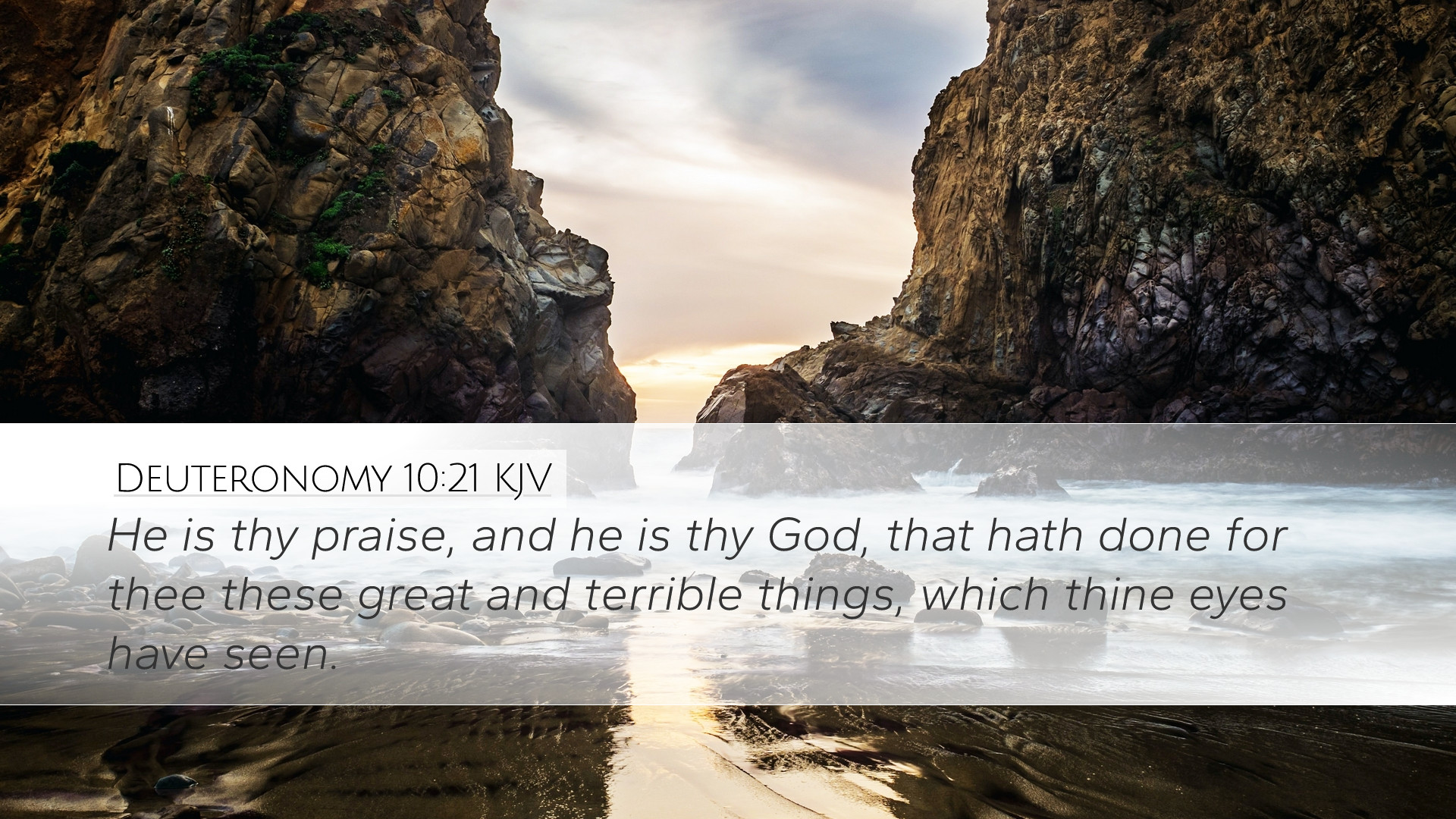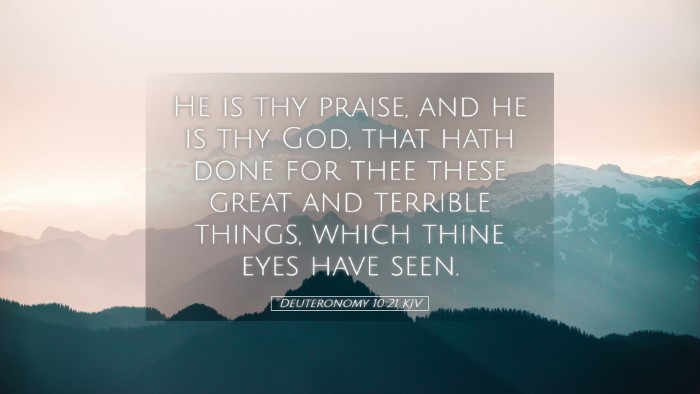Commentary on Deuteronomy 10:21
Bible Verse: "He is thy praise, and He is thy God, that hath done for thee these great and terrible things, which thine eyes have seen."
Introduction
Deuteronomy 10:21 encapsulates a powerful declaration regarding the identity of God and His pivotal role in the life of Israel. The verse serves as a reminder of God's love, faithfulness, and the remarkable deeds He has performed. Various public domain commentaries unveil depth and richness in this passage, offering insights that are valuable to pastors, students, theologians, and scholars.
Matthew Henry's Commentary
Matthew Henry asserts the significance of recognizing God as both "thy praise" and "thy God." This dual role emphasizes the deep relationship between God and His people. Henry highlights several key points:
- Praise as Recognition: The term "praise" underlines that God should be acknowledged for His greatness. Henry stresses that the acts of worship should not only be verbal but reflected in the lives of the believers.
- God’s Nature: The phrase "that hath done for thee" points towards God's active involvement in human affairs. Henry notes that God's miraculous deeds, referred to as "great and terrible things," are evidence of His sovereignty and power.
- Personal Relationship: The use of "thy" is significant. It reflects an intimate relationship whereby God is not merely a distant deity but a personal God who walks with His people.
Albert Barnes' Commentary
Albert Barnes elaborates on the implications of God's greatness and the obligations it places on Israel:
- God’s Acts: Barnes emphasizes the necessity to remember God's past acts, as they affirm His faithfulness. The phrase "great and terrible things" illustrates the profound nature of God’s interaction with His people, marking significant moments of divine intervention.
- Encouragement for Faithfulness: Barnes connects this recognition of God’s greatness to the need for Israel to remain faithful to Him. Understanding the magnitude of what God has done should serve as motivation for obedience and loyalty.
- Theological Implications: The declaration that "He is thy praise" invites theological reflection on worship. It implies that true worship revolves around an awareness of God's character and acts, leading to a lifestyle that glorifies Him.
Adam Clarke's Commentary
Adam Clarke's perspective sheds light on the emotional aspects associated with worship and gratitude towards God:
- Worship as a Response: Clarke points out that recognizing God’s goodness and greatness should naturally lead to a life of worship. This verse isn't just an acknowledgment; it speaks of a heart overflowing with praise due to experiential knowledge of God.
- Faithfulness through Remembrance: Clarke emphasizes the importance of memory in sustaining faith. The act of remembering God's deeds is vital for maintaining a steadfast relationship with Him. Clarke encourages believers to recount God’s faithfulness in their lives regularly.
- Personal Testimony: Clarke highlights the role of personal testimony in the life of a believer. Their experiences of God’s "great and terrible things" can serve as encouragement for others, showcasing God's attributes and actions.
Thematic Insights
There are several overarching themes drawn from the collective insights of these commentators:
- The Character of God: Central to Deuteronomy 10:21 is the notion of God's character—He is likened unto a source of both reverence and intimate relationship. God is depicted as majestic yet approachable, motivating worship that stems from understanding.
- Obligation of the Believer: The remembrance of God's acts obliges believers to respond in faithfulness and worship. This passage serves as a reminder that to disregard God’s past provisions is to deny Him the praise He deserves.
- Community of Faith: The collective memory of God's deeds is not just personal but communal. The shared history of His actions fosters unity and provides a foundation for the community's identity and purpose.
Conclusion
Deuteronomy 10:21 serves as a powerful reminder for believers of the importance of recognizing God's active role in their lives. Through collective insights from Matthew Henry, Albert Barnes, and Adam Clarke, this verse encourages a profound sense of gratitude, worship, and dependency on God. Believers are called to not only acknowledge but to celebrate the mighty acts of God—both past and present—ensuring that their praise is not merely in words, but in the lived experience of their faith.


